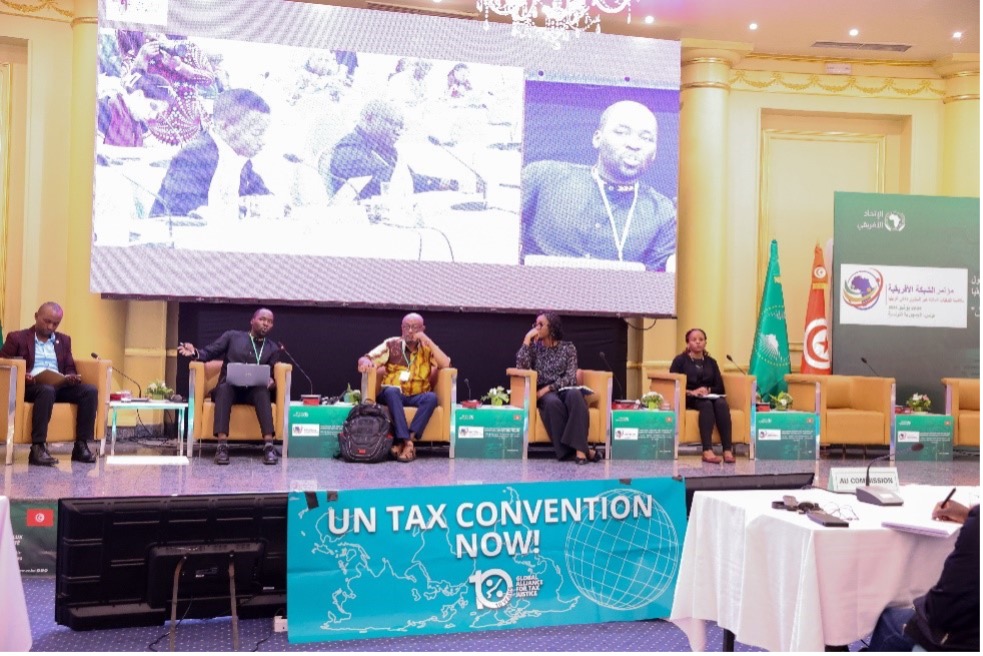Date

Tax Justice stakeholders continued to question the legitimacy of Organization for Economic Development (OECD) in dictating the global tax rules and called for a more equitable and inclusive financial system.
Speaking during the CSO side session at the Pan African Network Conference in Tunis, Tunisia, Tax Justice Network Africa (TJNA) Executive Director Chenai Mukumba expressed her displeasure on the role of OECD in formulating global tax policy, which critics claim disproportionately benefit affluent countries.
Ms. Mukumba’s sentiment reflects a broader discontent with the OECD's influence, particularly as it relates to recent tax reform proposals. Despite the OECD's role in pioneering initiatives such as the Base Erosion and Profit Shifting (BEPS) project, which aims to curb corporate tax avoidance, significant concerns remain.
“There is a lack of consensus even among OECD members. For instance, the United States, a key member, has not fully endorsed the latest OECD tax proposals, raising questions about their efficacy and the true intent behind them,” said Ms Mukumba.
Ms. Mukumba’s question highlights a critical issue: the disparity between the OECD's influence and the interests of less wealthy nations. Developing countries, which often face higher rates of tax evasion and illicit financial flows, find themselves sidelined in a system that appears to prioritize the needs and perspectives of its wealthier members.
Amid these challenges, new platforms for financial reform are emerging. One such platform is the UN Framework Convention on International Tax Cooperation, which advocates for a more inclusive and equitable approach to global tax policy.
In August this year, the United Nations (UN) Member States adopted, by an overwhelming majority, the Ad Hoc Committee’s Draft Terms of Reference for a United Nations Framework Convention on International Tax Cooperation. This comes after the High-Level Panel on Illicit Financial Flows from Africa (HLP), chaired by former South African President Thabo Mbeki, rooted for Africa to step up efforts to ensure that the UN plays a more prominent role in tacking illicit financial flows.
The UN Framework Convention will address deep-rooted power imbalances by providing a more representative platform for all member states, not just the wealthiest. The convention promises a holistic approach to international tax cooperation, emphasizing the need for fairer and more transparent processes that account for the diverse economic contexts of all nations.
The potential of the UN Framework Convention lies in its ability to tackle the structural inequalities that have long characterized the global financial system. By bringing all member states to the table, it seeks to ensure that tax policies are not only fairer but also more reflective of the needs of developing countries.
While the OECD’s dominance in global tax policy remains a point of contention, the UN Framework Convention on International Tax Cooperation offers a beacon of hope for a more equitable system. As Mukumba's pointed question suggests, it is crucial to reassess who truly holds the power in shaping global tax rules and ensure that future reforms are inclusive and just.
The OECD's BEPS project was initiated in 2013 and is aimed at addressing gaps in international tax rules that allow multinational companies to shift profits to low-tax jurisdictions.
According to the International Monetary Fund (IMF), developing countries lose around $200 billion annually due to tax evasion and illicit financial flows.
The UN Framework Convention aims to provide a more inclusive platform for tax policy discussions, including representatives from developing countries who have historically been marginalized in OECD-led processes.
Related resources: